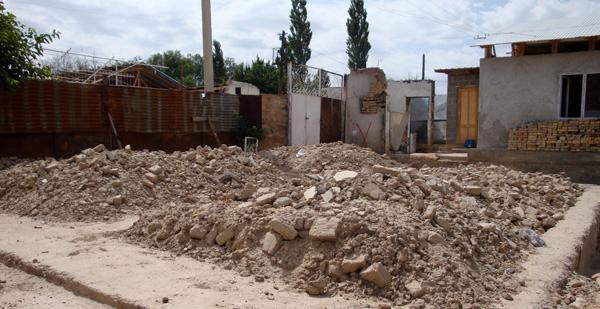Kyrgyzstan Tries to Get Over its Violent Past
(Photo: Lily Jamali)
By Lily Jamali
The central Asian nation of Kyrgyzstan is still recovering from a turbulent 2010. A bloody revolt ousted its president in April of that year. The following June ethnic violence in the south left more than 400 people dead.
One year later, Kyrgyzstan is moving forward from those terrible times. The country has scheduled a presidential election in October. But Kyrgyzstan’s violent past remains all too present today.
Odina has vivid memories of last year’s violence in southern Kyrgyzstan. Her teenage son was shot several times. He was hospitalized for days before Odina found him.
“His condition was very bad,” Odina said. “At first, I didn’t recognize him.”
Odina is an ethnic Uzbek from a majority Uzbek neighborhood in Osh. Most ethnic Uzbeks here live in temporary structures. Kyrgyz mobs destroyed their old homes during the ethnic violence in southern Kyrgyzstan last year. Odina lives in limbo and she seems to have given up hope.
“I don’t have the will to live,” she said. “After something like this, you lose interest in everything.”
Across town, in an ethnic Kyrgyz neighbourhood, a Kyrgyz grandmother named Sharipa Abdekerimova is also living in a temporary shelter. Abdekerimova lost her home last year too – to an Uzbek mob.
“I want peace,” Abdekerimova said, “and I hope nothing like that happens again.”
Different narratives have emerged to explain how what people here call the “June events” began. An independent international commission found that both sides committed acts of violence. But most of the victims were Uzbek. The commission also uncovered evidence that Kyrgyz law enforcement, at times, participated in the attacks. The release of the commission’s final report prompted the parliament to ban the report’s lead author, a Finnish politician, from entering Kyrgyzstan. That decision — and others — has led to cynicism about the government’s handling of the aftermath of last year’s ethnic violence.
Ole Solvang, a researcher with Human Rights Watch, said Kyrgyz authorities have not done their job.
“There has been a failure to provide both, accountability for perpetrators, but also justice for the victims, and that failure is part of what prolongs the tensions between the Kyrgyz and Uzbeks,” Solvang said.
Rebuilding has begun here in Osh, but the charred remains of many homes and shops still mar the city. A Kyrgyz woman named Taalaibubu lost her stand at the bazaar when a mob overran it.
“They broke into my stall and they burned it down,” she said.
Taalaibubu recently met a group of women, Kyrgyz and Uzbek, in similar situations. They have formed a group that provides legal help to female entrepreneurs. Such partnerships offer some hope for the future. But old attitudes remain.
Many Kyrgyz fear that ethnic Uzbeks in southern Kyrgyzstan want to secede, and Uzbeks still feel marginalized by the ethnic Kyrgyz-dominated government. Eric McGlinchey of George Mason University said reconciliation can come only when that changes.
“There has to be some kind of greater incorporation of the Uzbek population into the political structures, in the military and police structures of Southern Kyrgyzstan, if Kyrgyzstan is going to get beyond this underlying ethnic divide that they now have,” McGlinchey said.
Meanwhile, Kyrgyzstan is moving closer to becoming Central Asia’s first parliamentary democracy. The United States backs the new model, but Kyrgyzstan’s former master, Russia, opposes it. There are American and Russian military air bases in Kyrgyzstan. And, in addition to the ethnic rivalries here, there may also be a nascent Islamic militant movement. The U-S certainly does not want to see a failed state here.
